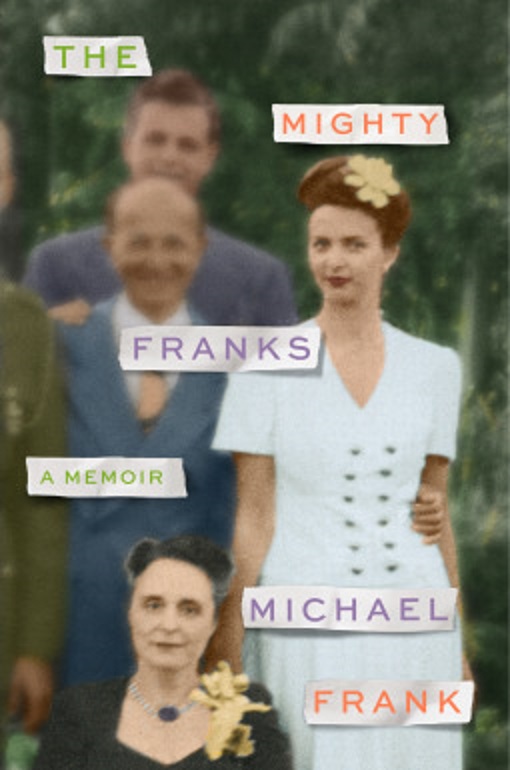
The Mighty Franks
A Memoir
کتاب های مرتبط
- اطلاعات
- نقد و بررسی
- دیدگاه کاربران
نقد و بررسی

February 27, 2017
In this complex and fascinating memoir, journalist Frank describes the spell cast over his childhood by his screenwriter aunt and her fury at his attempts to break away from her. Even by Hollywood standards, the Franks were unusual: Frank’s mother’s brother, Irving Ravetch, married his father’s sister, Harriet “Hank” Frank Jr., and both families lived in close proximity in Laurel Canyon. His childless aunt and uncle settled on Frank as a substitute son, dazzling him with gifts and praise. Yet as Frank became conscious of the damage that Hank’s imperious nature inflicted on family and friends, he realized how necessary, and painful, separating himself from her would be. For over three decades, Ravetch and Hank were an extremely successful screenwriting team (Norma Rae, Hud, The Long Hot Summer, etc.). In thoughtful, fluid prose, their nephew evokes the magic and sophistication of a vanished Hollywood intelligentsia schooled in the language of cinema. Readers will be enthralled by the affecting portraits of the two central figures: the aunt whose drive and charming idiosyncrasies concealed an impulsive cruelty, and the child struggling to make sense of the complex, damaged woman trying to control him. Frank doesn’t fully investigate the reasons behind his aunt’s behavior, but the women he describes is as iconic and memorable as the characters she created for the screen.

March 1, 2017
A writer reflects on his celebrated aunt's overbearing influence on his life.Eccentric family dynamics provide the backdrop for this coming-of-age memoir from Frank, a travel writer and former Los Angeles Times book critic, who recalls the unusually close ties between his immediate family and his aunt and uncle, noted screenwriters Harriet Frank Jr. and Irving Ravetch. The two families lived just blocks apart from each other in the Laurel Canyon neighborhood of LA. The driving power source within the family is Harriet, aka Auntie Hankie, a charismatic yet manipulative and narcissistic woman with lavish spending habits and pretentious manners. Early on in Frank's childhood, Hankie showed great interest in his upbringing, aggressively influencing his interests and tastes and eventually becoming an all-consuming force in his life and major disrupter within the family. As he grew through his teens and early adult life, Hankie's influence became increasingly difficult for him to bear. Throughout much of the narrative, the author documents her frequently erratic and cruel behavior in relentless detail. Though she was clearly a deeply troubled individual, the portrayal feels excessively narrow; there seems to be more to her than Frank conveys here. The author alludes to her glamorous Hollywood connections yet provides scant attention to her actual work. Though not necessarily a household name for current moviegoing audiences, her accomplishments as a screenwriter, often in collaboration with her husband, were significant, especially in such notable films as Hud (1963), starting Paul Newman, and Norma Rae (1979), starring Sally Field and Beau Bridges, both of which earned Academy Award nominations. The author occasionally displays a novelist's flare in his descriptions of family members and the LA environment of the 1960s and '70s, but readers may feel that there is more to this story than what is presented here. A lengthy exploration of one family's uniquely claustrophobic dysfunctions; Frank only finds mixed success in delivering a compelling narrative to bolster the provocative premise.
COPYRIGHT(2017) Kirkus Reviews, ALL RIGHTS RESERVED.

Starred review from April 15, 2017
At the center of Frank's extraordinary tale is his Aunt Harriet Frank Jr., a screenwriter perhaps best known for her work with director Martin Ritt. Late in the book, the author comments that he first tried writing about Harriet as a fictional character but was consistently told that people like her just don't exist. Well, they do, and here she is: an insecure and egocentric tyrant who always gets her way. She identifies her nephew early on as the perfect victim and begins stroking his ego by telling him how smart and different he is. She demands that he read the best books, view the best art, and basically take in the best of everything. Yet she seems to care little for him as a person, and as he comes to realize this and starts to rebel, his aunt's outbursts become more extreme and frequent, and their relationship begins to break down irrevocably. Truth is not just stranger than fiction, it's more interesting, too. VERDICT More than a memoir, this account offers a study of human pathology and should be read widely for its insights into families and the processes of growing up. [Memoir, 3/15/17; ow.ly/tdvI30a5BVh]--Derek Sanderson, Mount Saint Mary Coll., Newburgh, NY
Copyright 2017 Library Journal, LLC Used with permission.

























دیدگاه کاربران